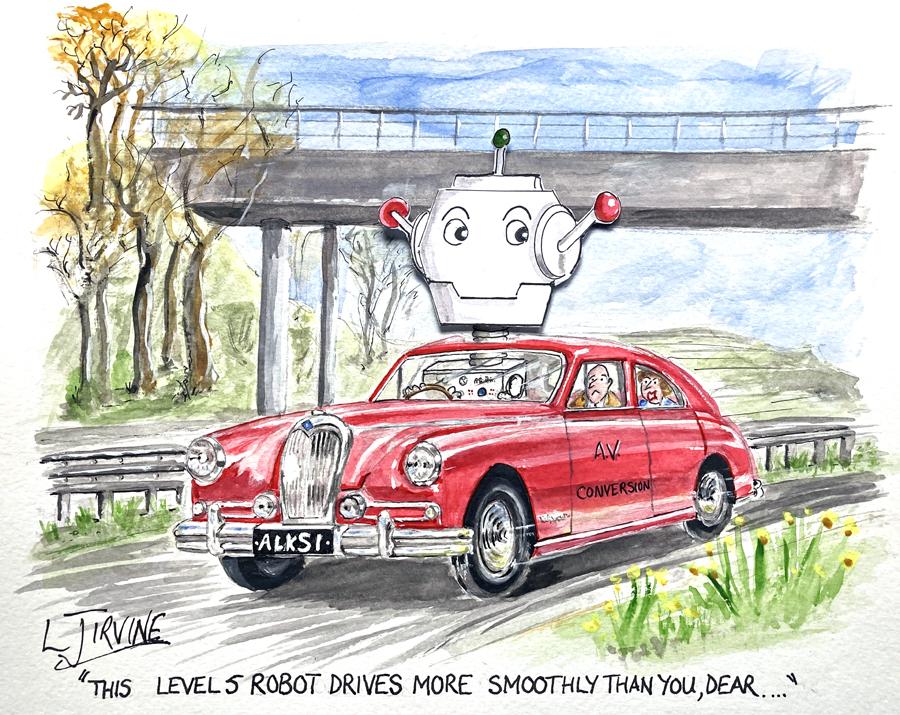FBHVC observations on self-driving vehicles acknowledged by Transport Committee

Published: 21/09/2023
The House of Commons Transport Committee has published a report on self-driving vehicles, after its inquiry into the subject, with recommendations to government. The Government has two months to respond.
It says that "legislation is needed to continue great British success story of self-driving vehicles."
The cross-party Committee makes a number of recommendations on how regulations should be updated to tackle concerns about safety and security, dilemmas over legal liability, as well as infrastructure that will be needed to accommodate
their introduction.
The Federation has responded to Government Consultations on autonomous or self-driving vehicles with its submissions primarily directed at ensuring that such vehicles will safely recognise and interact with historic vehicles on UK roads.
The Transport Select Committee has taken evidence on the Government strategy on the issue and has just published its conclusions in a report https://publications.parliament.uk/pa/cm5803/cmselect/cmtrans/519/summary.html
The report examines where we are on the introduction of self-driving vehicles in the UK and makes number of recommendations on how regulations should be updated to tackle concerns about safety and security, dilemmas over legal liability, as well as infrastructure that will be needed to accommodate their introduction.
The Federation is pleased to note that some of its observations on the limitations of existing driver assist technology made to earlier DfT Consultations are recognised by the Committee. The FBHVC will consider the recommendations set out in the report in more depth.
The official summary of the full report, published by the Committee says:
Summary
In August 2022 the Government outlined its vision for self-driving vehicles, promising early deployments in the UK by 2025 and a comprehensive regulatory, legislative and safety framework. It told us that self-driving vehicles are “the future of road travel”.
We agree that it is a crucial time for self-driving vehicles. Their potential to revolutionise transport is obvious, but, as the technology matures and real-world uses become less hypothetical, many challenges remain. For the UK specifically, there may be a delicate balance to be struck between remaining at the forefront of innovation and keeping the wider public on board.
How could self-driving vehicles be used?
There is a broad range of possible uses for self-driving vehicles from HGVs and buses to taxis and private cars. We believe they have the potential to improve transport connectivity with significant safety, productivity, and mobility benefits.
However, over the last decade, progress in this technology has failed to meet many of its promoters’ predictions, and this has bred understandable cynicism. Hopefully expectations of self-driving vehicle technology have become more realistic. Self-driving vehicles that can go anywhere at any time remain purely hypothetical, but in more circumscribed forms they can become reality.
In principle we welcome the introduction of self-driving vehicles, but the Government must take a cautious, gradual approach with the technology introduced only in well-defined and appropriate contexts. As such, we broadly welcome the strategy the Government has set out. However, without careful handling, self-driving vehicles could worsen congestion and exacerbate existing inequalities in transport access. The Government must ensure the introduction of self-driving vehicles is responsive to the wider population and meets the UK’s transport goals.
How safe are self-driving vehicles?
While it is widely assumed that self-driving vehicles will prove safer than human drivers, this is not a given. Optimistic predictions are often based on widespread self-driving vehicle usage that is decades away, or assertions about human error that ignore other risks. Safety must remain the Government’s overriding priority as self-driving vehicles encounter real-world complexity. Given this, we question the Government’s proposed ambition that self-driving vehicles must be as safe as a competent and careful human driver. This is too weak and too vague. The Government should set a clearer, more stretching threshold.
Greater automation will reduce time spent driving. Over time drivers may become less practised and therefore less skilled. Conversely, the demands on drivers will grow as they will be called upon to retake control of vehicles in challenging circumstances with little notice. The Government should set out a strategy for the future of human driving in a world of self-driving vehicles. This should include possible changes to driving tests and a plan to ensure that all drivers fully understand self-driving vehicles and both acquire and maintain the necessary skills for taking control of a vehicle in all circumstances.
The introduction of self-driving vehicles to the UK’s roads will affect all road users. We believe that this should not impose new responsibilities on other road users and pedestrians, limit their access to, or use of, public infrastructure or, crucially, make them less safe.
What other risks do self-driving vehicles pose?
Self-driving vehicles pose cybersecurity risks, broadly because of their connected rather than automated capabilities. This poses new dangers, which the law must evolve to meet. A safety-led culture will require wide access to data, and this must be a higher priority than commercial confidentiality.
Ensuring self-driving vehicles are roadworthy will be more complicated than for conventional vehicles, not least because there is more that can go wrong. Legal liability also becomes more complex as it is shared between owner and operator. This may cause problems for the insurance industry. The Government explained broadly how its new regulatory regime will work but accepted that more thinking was needed about how this will work in practice.
What infrastructure will be needed?
Self-driving vehicles will need well-maintained roads and signage, nationwide connectivity, and up-to-date digital information about the road network. While some steps have been taken towards this by the Government and public bodies, these preparations are too siloed and divorced from broader planning. If the Government is serious about self-driving vehicles, it should ensure meeting their needs is an integral part of future infrastructure strategy.
What legal changes are needed?
The current laws for self-driving vehicles are archaic and limiting, especially concerning testing and legal liability. We commend the work of the Law Commissions and the Government in devising a new legal framework. That framework has broad support, albeit with more detail needed in some areas. This makes it deeply disappointing that the Government will not commit to legislating in this Parliament to put this framework in place.
The self-driving vehicle sector is a British success story. We were impressed, unfailingly so, by the energy, creativity, and expertise of all those we met, whether from industry, academia, Government or somewhere in between. We have a competitive advantage, and we must maintain it. To do this the Government must pass comprehensive legislation in the next parliamentary session to put in place the robust regulatory framework it promised. Failing to do so will do significant and lasting damage both to the UK’s self-driving vehicle industry and to this country’s reputation as a trailblazer.










